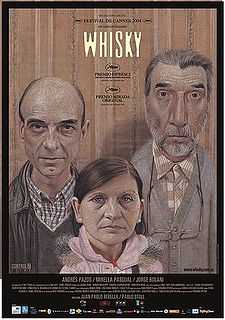Whisky (film)
| Whisky | |
|---|---|
 theatrical poster | |
| Directed by |
Juan Pablo Rebella Pablo Stoll |
| Produced by |
Executive Producer: Fernando Epstein Producers: Christoph Friedel Hernán Musaluppi |
| Written by |
Gonzalo Delgado Juan Pablo Rebella Pablo Stoll |
| Starring |
Andrés Pazos Mirella Pascual Jorge Bolani |
| Music by | Pequeña Orquesta Reincidentes |
| Cinematography | Bárbara Álvarez |
| Editing by | Fernando Epstein |
| Distributed by | MK2 Diffusion |
| Release dates |
May 19, 2004 (premiere at Cannes) |
| Running time | 99 minutes |
| Country |
Argentina Germany Spain Uruguay |
| Language |
Spanish Italian |
| Budget |
$500,000 estimated. |
Whisky is an Argentine-German-Spanish-Uruguayan tragicomedy film directed by Juan Pablo Rebella and Pablo Stoll and released in 2004.[1] The film stars Andrés Pazos, Mirella Pascual, Jorge Bolani, Ana Katz, and Daniel Hendler. It has very sparse dialogue and the three principal actors play very straight roles showing little emotion. It was premiered at the 2004 Cannes Film Festival where it won a Prix du Regard Original Award.[2]
Plot
On the first anniversary of his mother's death, Jacobo (Andres Pazos), the owner of a small and struggling sock factory, asks one of his attentive employees, Marta (Mirella Pascual), to spend a few days at his home pretending to be his wife because his brother, Herman (Jorge Bolani), is arriving for a visit. Jacobo and Marta's lives are very dull and repetitious. It takes some time to realize that Jacobo asks Marta because he has no one else to ask. Why Marta agrees is another matter.
Jacobo is aware that his brother has become more successful since moving away and possibly resents the time that he had to devote to nursing their dying mother, rather than working on his own business. Herman's visit is initially an uneasy time for the two brothers who clearly have little in common, however, shortly before he is due to return home, Herman asks Jacobo and Marta to accompany him on a visit to a resort where they spent time as children with their parents. Marta is keen to go and Jacobo reluctantly agrees. During the holiday Marta and Herman become closer and the suggestion develops that they may actually have feelings for each other. Jacobo remains cold and unemotional towards both the other characters and seems keen for the experience to end.
Just before he is due to go home Herman gives Jacobo a sum of money as compensation for the time that he lost by having to care for their mother. Jacobo is initially unwilling to accept it, but takes the money after witnessing Herman sing a love song towards Marta in a Karaoke restaurant that the three visit.
Later that night Jacobo goes alone to a casino, placing all the money on Black 24 in a game of roulette and wins. He keeps some of the money, but wraps the larger part up as a present. As they say goodbye to Herman, Marta presses a note into his hand telling him to read it on the plane. When they get back home, Jacobo calls a taxi for Marta and gives her the cash present which she is last seen holding in the back of the cab. The following morning she does not turn up for work, although Jacobo goes through the same routine as always.
Cast
- Andrés Pazos as Jacobo Koller
- Mirella Pascual as Marta Acuña
- Jorge Bolani as Herman Koller
- Ana Katz as Graciela, the young wife
- Daniel Hendler as Martín, the young husband
- Verónica Perrotta as Jacobo's worker 1
- Mariana Velazques as Jacobo's worker 2
- Dumas Lerena as Isaac, Jacobo's client
- Damián Barrera as Andrés, the receptionist
- Alfonso Tort as Juan Carlos, the bellboy
- Francisca Barreira as Young girl singer
- Richard G. Hogan as Young Beggar (uncredited)
Exhibition
The film was first presented at the 2004 Cannes Film Festival on May 19.
The picture was screened at various film festivals, including: the La Rochelle Film Festival, France; the Karlovy Vary Film Festival, Czech Republic; the Brussels Cinédécouvertes Film Festival, Belgium; the Copenhagen International Film Festival, Denmark; the Toronto Film Festival, Canada; and others. It was awarded the Colón de Oro at the Festival de Cine Iberoamericano de Huelva.
Reception
The film was well received by film critics and at the film festival it was screened. Critic Manohla Dargis, writing for the New York Times said, "the film is a model of both fiscal and narrative economy, and the kind of work – gleaned from the mysteries of consciousness, telling quotidian details and a sense of aesthetic proportion – that is too often missing from American independent cinema."[3]
References
- Notes
- ↑ Whisky at the Internet Movie Database.
- ↑ "Festival de Cannes: Whisky". festival-cannes.com. Retrieved 2009-12-03.
- ↑ Dargis, Manohla. The New York Times, film review, "A Tale of Connections, Tiny Ones Made and Far Greater Ones Lost Forever," March 3, 2005.
External links
- Whisky at the cinenacional.com (Spanish).
- Whisky at the Internet Movie Database
- Whisky at allmovie